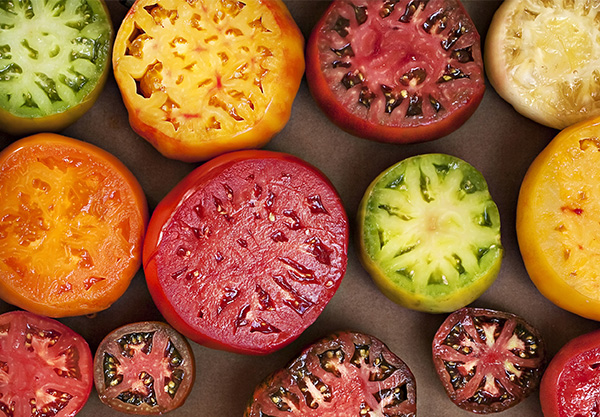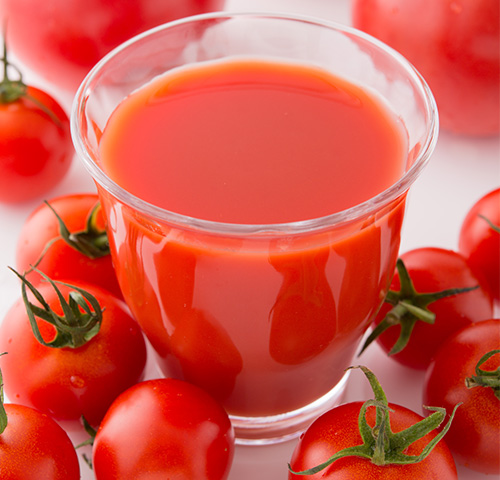 Ultimate Protector contains tomato, as well as components from 29 different fruits, vegetables, and herbs. Each of these ingredients contain substances that may be considered to be polyphenols, antioxidants and Nrf2 activators. In this article I will explore the ingredient tomato which is a component of VitaVeggie® from Futureceuticals.
Ultimate Protector contains tomato, as well as components from 29 different fruits, vegetables, and herbs. Each of these ingredients contain substances that may be considered to be polyphenols, antioxidants and Nrf2 activators. In this article I will explore the ingredient tomato which is a component of VitaVeggie® from Futureceuticals.
For over 10 years now it has been scientifically documented that the consumption of tomatoes is protective against chronic diseases such as cancer and cardiovascular diseases. It has generally been accepted that the primary component in tomatoes responsible for this protection is the lycopene although there other carotenoids such as phytoene, phytofluene, β-carotene, and astaxanthin in tomatoes as well.
Many scientists have surmised that it was the antioxidant properties of the lycopene and other carotenoids that were responsible for protective effects, but more recent research has shown that lycopene and the other carotenoids are Nrf2 activators as well. In addition, lycopene appears to upregulate the production of the body’s protective enzymes at the the antioxidant response element (ARE) of the DNA.

Below, I have provided a variety of abstracts that relate to the research on the protective effects of tomato and its carotenoids.
Overview of mechanisms of action of lycopene
From: http://www.ncbi.nlm.nih.gov/pubmed/12424335 Exp Biol Med (Maywood). 2002 Nov;227(10):920-3,Heber D1, Lu QY.
Abstract
Dietary intakes of tomatoes and tomato products containing lycopene have been shown to be associated with decreased risk of chronic diseases such as cancer and cardiovascular diseases in numerous studies. Serum and tissue lycopene levels have also been inversely related to the risk of lung and prostate cancers. Lycopene functions as a very potent antioxidant, and this is clearly a major important mechanism of lycopene action. In this regard, lycopene can trap singlet oxygen and reduce mutagenesis in the Ames test. However, evidence is accumulating for other mechanisms as well. Lycopene at physiological concentrations can inhibit human cancer cell growth by interfering with growth factor receptor signaling and cell cycle progression specifically in prostate cancer cells without evidence of toxic effects or apoptosis of cells. Studies using human and animal cells have identified a gene, connexin 43, whose expression is upregulated by lycopene and which allows direct intercellular gap junctional communication (GJC). GJC is deficient in many human tumors and its restoration or upregulation is associated with decreased proliferation. The combination of low concentrations of lycopene with 1,25-dihydroxyvitamin D3 exhibits a synergistic effect on cell proliferation and differentiation and an additive effect on cell cycle progression in the HL-60 promyelocytic leukemia cell line, suggesting some interaction at a nuclear or subcellular level. The combination of lycopene and lutein synergistically interact as antioxidants, and this may relate to specific positioning of different carotenoids in membranes. This review will focus on the growing body of evidence that carotenoids have unexpected biologic effects in experimental systems, some of which may contribute to their cancer preventive properties in models of carcinogenesis. Consideration of solubility in vitro, comparison with doses achieved in humans by dietary means, interactions with other phytochemicals, and other potential mechanisms such as stimulation of xenobiotic metabolism, inhibition of cholesterogenesis, modulation of cyclooxygenase pathways, and inhibition of inflammation will be considered. This review will point out areas for future research where more evidence is needed on the effects of lycopene on the etiology of chronic disease.
Processed tomato products as a source of dietary lycopene: bioavailability and antioxidant properties
From: http://www.ncbi.nlm.nih.gov/pubmed/15596034
Can J Diet Pract Res. 2004 Winter;65(4):161-5, Rao AV.
Abstract
Oxidative stress is one of the major contributors to increased risk of chronic diseases. A diet rich in tomatoes and tomato products containing lycopene, a carotenoid antioxidant, has been found to protect against these chronic diseases by mitigating oxidative damage. The study aim was to evaluate the effects of a long-term tomato-rich diet, consisting of various processed tomato products, on bioavailability and antioxidant properties of lycopene. Seventeen healthy human subjects (ten men, seven non-pregnant women) participated in the study. Following a two-week washout period during which subjects avoided foods containing lycopene, all subjects consumed test tomato products including tomato juice, tomato sauce, tomato paste, ketchup, spaghetti sauce, and ready-to-serve tomato soup providing 30 mg of lycopene a day for four weeks. At the end of treatment, serum lycopene level increased significantly (p <0.05), from 181.79 +/- 31.25 to 684.7 +/- 113.91 nmol/L. Similarly, total antioxidant potential increased significantly (p <0.05), from 2.26 +/- 0.015 to 2.38 +/- 0.17 mmol/L Trolox equivalent. Lipid and protein oxidation was reduced significantly (p <0.05). The results suggest that a tomato-rich diet containing different sources of lycopene can increase serum lycopene levels and reduce oxidative stress effectively.
Carotenoids activate the antioxidant response element transcription system
From: http://mct.aacrjournals.org/content/4/1/177.full
, , , , ,, , , and
Abstract
Epidemiologic studies have found an inverse association between consumption of tomato products and the risk of certain types of cancers. However, the mechanisms underlying this relationship are not completely understood. One mechanism that has been suggested is induction of phase II detoxification enzymes. Expression of phase II enzymes is regulated by the antioxidant response element (ARE) and the transcription factor Nrf2 (nuclear factor E2-related factor. In this study, we determined the role of this transcription system in the induction of phase II enzymes by carotenoids. We found that in transiently transfected cancer cells, lycopene transactivated the expression of reporter genes fused with ARE sequences. Other carotenoids such as phytoene, phytofluene, β-carotene, and astaxanthin had a much smaller effect. An increase in protein as well as mRNA levels of the phase II enzymes NAD(P)H:quinone oxidoreductase and γ-glutamylcysteine synthetase was observed in nontransfected cells after carotenoid treatment. Ethanolic extract of lycopene containing unidentified hydrophilic derivatives of the carotenoid activated ARE with similar potency to lycopene. The potency of the carotenoids in ARE activation did not correlate with their effect on intracellular reactive oxygen species and reduced glutathione level, which may indicate that ARE activation is not solely related to their antioxidant activity. Nrf2, which is found predominantly in the cytoplasm of control cells, translocated to the nucleus after carotenoid treatment. Interestingly, part of the translocated Nrf2 colocalized with the promyelocytic leukemia protein in the promyelocytic leukemia nuclear bodies. The increase in phase II enzymes was abolished by a dominant-negative Nrf2, suggesting that carotenoid induction of these proteins depends on a functional Nrf2 and the ARE transcription system.

Tomato powder supplementation activates Nrf-2 via ERK/Akt signaling pathway and attenuates heat stress-related responses in quails
From: http://www.sciencedirect.com/science/article/pii/S037784011100085X
Authors: K. Sahina, C. Orhana, F. Akdemira, M. Tuzcub, S. Alic, N. Sahina
Abstract
Rearing birds at temperatures higher than thermoneutral temperature might impair cellular signal transduction pathways, influencing the expression of genes coding for antioxidant proteins, and affect the laying performance of the bird. This experiment was conducted to evaluate the effects of tomato powder supplementation on the activation of nuclear factor erythroid 2-related factor 2 (Nrf-2), and phosphorylated forms of extracellular signal- regulated kinase (ERK) 1/2 and protein kinase B (Akt) in heat stressed Japanese quails (Coturnix coturnix Japonica). A total of 180 five-week-old female Japanese quails were reared either at 22 ◦ C for 24 h/d (thermoneutral, TN) or 34 ◦ C for 8 h/d (heat stress, HS) for 12 weeks. Birds were randomly fed one of the three diets: basal diet or basal diet supplemented with 25 or 50 g/kg tomato powder. Each of the 2 × 3 factorially arranged groups was replicated in 10 cages, each containing 3 quails. Significantly higher level of Nrf-2 (P<0.001), ERK 1/2 (P<0.001) and Akt (P<0.001) were found in HS quails when compared to the TN group. The effect was dose dependent, and counteracted by tomato powder supplementation. The HS group also showed a concomitant increase in the activation of nuclear factor-kappa B.
Effect of lycopene on cell viability and cell cycle progression in human cancer cell lines
From: http://www.ncbi.nlm.nih.gov/pubmed/22866768
Cancer Cell Int. 2012 Aug 6;12(1):36. doi: 10.1186/1475-2867-12-36, Teodoro AJ1, Oliveira FL, Martins NB, Maia Gde A, Martucci RB, Borojevic R.
Abstract
BACKGROUND:
Lycopene, a major carotenoid component of tomato, has a potential anticancer activity in many types of cancer. Epidemiological and clinical trials rarely provide evidence for mechanisms of the compound’s action, and studies on its effect on cancer of different cell origins are now being done. The aim of the present study was to determine the effect of lycopene on cell cycle and cell viability in eight human cancer cell lines.
METHODS:
Human cell lines were treated with lycopene (1-5 μM) for 48 and 96 h. Cell viability was monitored using the method of MTT. The cell cycle was analyzed by flow cytometry, and apoptotic cells were identified by terminal deoxynucleotidyl transferase-mediated dUTP nick labeling (TUNEL) and by DAPI.
RESULTS:
Our data showed a significant decrease in the number of viable cells in three cancer cells lines (HT-29, T84 and MCF-7) after 48 h treatment with lycopene, and changes in the fraction of cells retained in different cell cycle phases. Lycopene promoted also cell cycle arrest followed by decreased cell viability in majority of cell lines after 96 h, as compared to controls. Furthermore, an increase in apoptosis was observed in four cell lines (T-84, HT-29, MCF-7 and DU145) when cells were treated with lycopene.
CONCLUSIONS:
Our findings show the capacity of lycopene to inhibit cell proliferation, arrest cell cycle in different phases and increase apoptosis, mainly in breast, colon and prostate lines after 96 h. These observations suggest that lycopene may alter cell cycle regulatory proteins depending on the type of cancer and the dose of lycopene administration. Taken together, these data indicated that the antiproliferative effect of lycopene was cellular type, time and dose-dependent.

A dose-response study on the effects of purified lycopene supplementation on biomarkers of oxidative stress
From: http://www.ncbi.nlm.nih.gov/pubmed/18689558
J Am Coll Nutr. 2008 Apr;27(2):267-73, Devaraj S1, Mathur S, Basu A, Aung HH, Vasu VT, Meyers S, Jialal I.
Abstract
OBJECTIVE:
While tomato product supplementation, containing antioxidant carotenoids, including lycopene, decreases oxidative stress, the role of purified lycopene as an antioxidant remains unclear. Thus, we tested the effects of different doses of purified lycopene supplementation on biomarkers of oxidative stress in healthy volunteers.
METHODS:
This was a double-blind, randomized, placebo-controlled trial, examining the effects of 8-week supplementation of purified lycopene, on plasma lycopene levels, biomarkers of lipid peroxidation {LDL oxidizability, malondialdehyde & hydroxynonenals (MDA & HNE), urinary F(2)-isoprostanes}, and markers of DNA damage in urine and lymphocytes. Healthy adults (n = 77, age > or = 40 years), consumed a lycopene-restricted diet for 2 weeks, and were then randomized to receive 0, 6.5, 15, or 30 mg lycopene/day for 8 weeks, while on the lycopene-restricted diet. Blood and urine samples were collected at the beginning and end of Week 2 of lycopene-restricted diet, and at end of Week 10 of the study.
RESULTS:
Independent of the dose, plasma lycopene levels significantly increased in all lycopene supplemented groups versus placebo (p < 0.05). ANOVA revealed a significant decrease in DNA damage by the comet assay (p = 0.007), and a significant decrease in urinary 8-hydroxy deoxoguanosine (8-OHdG) at 8 weeks versus baseline (p = 0.0002), with 30 mg lycopene/day. No significant inter- or intra-group differences were noted for glucose, lipid profile, or other biomarkers of lipid peroxidation at any dose/time point.
CONCLUSIONS:
Thus, purified lycopene was bioavailable and was shown to decrease DNA oxidative damage and urinary 8-OHdG at the high dose.
Tomatoes versus lycopene in oxidative stress and carcinogenesis: conclusions from clinical trials
From: http://www.ncbi.nlm.nih.gov/pubmed/16929242
Eur J Clin Nutr. 2007 Mar;61(3):295-303. Epub 2006 Aug 16, Basu A1, Imrhan V.
Abstract
OBJECTIVE:
To review the effects of tomato product supplementation, containing lycopene, on biomarkers of oxidative stress and carcinogenesis in human clinical trials.
RESULTS:
Supplementation of tomato products, containing lycopene, has been shown to lower biomarkers of oxidative stress and carcinogenesis in healthy and type II diabetic patients, and prostate cancer patients, respectively. Processed tomato products like tomato juice, tomato paste, tomato puree, tomato ketchup and tomato oleoresin have been shown to provide bioavailable sources of lycopene, with consequent increases in plasma lycopene levels versus baseline. Dietary fats enhance this process and should be consumed together with food sources of lycopene. The mechanisms of action involve protection of plasma lipoproteins, lymphocyte DNA and serum proteins against oxidative damage, and anticarcinogenic effects, including reduction of prostate-specific antigen, upregulation of connexin expression and overall decrease in prostate tumor aggressiveness. There is limited in vivo data on the health benefits of lycopene alone. Most of the clinical trials with tomato products suggest a synergistic action of lycopene with other nutrients, in lowering biomarkers of oxidative stress and carcinogenesis.
CONCLUSIONS:
Consumption of processed tomato products, containing lycopene, is of significant health benefit and can be attributed to a combination of naturally occurring nutrients in tomatoes. Lycopene, the main tomato carotenoid, contributes to this effect, but its role per se remains to be investigated.
SUMMARY
It is reassuring to know that our old friend, the tomato, and its lycopene constituent are able to protect us from chronic diseases such as cancer and cardiovascular diseases. It is even more reassuring to understand that phytonutrients from tomato such as lycopene can act as powerful Nrf2 activators and are able to stimulate the production of protective endogenous enzymes. You can now appreciate the value of adding tomato (as a component of VitaVeggie®) to the list of ingredients in Ultimate Protector.
ADDITIONAL RESOURCES
HPDI BLOG ARTICLES
- Ultimate Protector Ingredients-Aronia (Chokeberry)
- Questions & Answers about Ultimate Protector
- The Amazing Healing Potential of Natural Nrf2 Activators
- New Directions For Preventing Free-Radical Damage
- Natural Phytochemical Nrf2 Activators for Chemoprevention
- Ultimate Protector™ Brunswick Labs ORAC5.0™ Test Results
- Description and Comparison of ORAC Tests for Well Known Plant Ingredients and Ultimate Protector™
- Ultimate Protector™: First Impressions
- Preventing Free-Radical Damage Using Ultimate Protector™
- PRO-C™ Super Antioxidant Formula
OTHER RESOURCES
- Ultimate Protector (product page)
- ORAC Database (including food ORAC test results)

